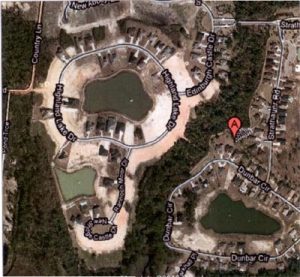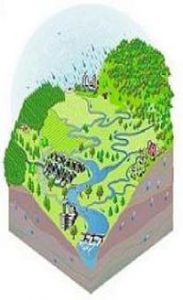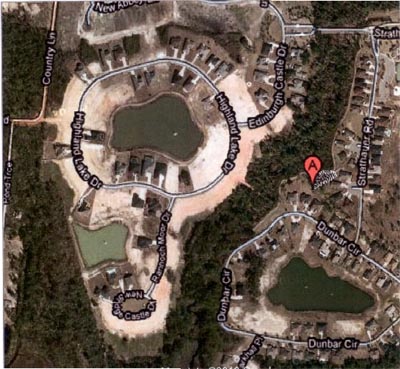
In recent years, extensive drainage plans have become an integral part of subdivision planning along the Gulf Coast. As topography changes and new land development impacts adjoining properties, the need for careful study of the effects of stormwater run-off becomes more important. Adequate reserve areas for run-off must be provided for in order to protect the community as a whole. The subdivision shown in this photo is a neighborhood that has been adversely affected by stormwater run-off issues; the lack of proper planning has greatly impacted the condition of and value of homes in the surrounding area.
Stormwater Management involves Understanding, Planning, Analyzing and Controlling the effects of storm water run-off in residential and commercial areas throughout the country. Federal, state and local municipalities have implemented various levels of storm water management programs, especially in coastal areas and river-bank cities.

ICC Code 402.3.2.1 Stormwater management. Stormwater management systems, including, but not limited to infiltration, evapotranspiration; rainwater harvest and runoff reuse; shall be provided and maintained on the building site. Stormwater management systems shall address the increase in runoff that would occur resulting from the construction of new buildings and impervious hardscapes…” Please go to www.iccsafe.org to view the January 4, 2010 guidelines and other helpful information.
The International Code Council, or the International Residential Code (IRC), has set guidelines for new construction and for additions of impervious spaces in their code documents. You will find the portions associated with the responsibilities of the developer or builder under the Plumbing section of the Code Book. In essence, it says that an addition of impervious space allowance must be made to contain, capture or drain additional run-off so as not to damage another’s property, as noted below:
Under the Clean Water Act, the Office of Wastewater Management [OWM] works in partnership with Environmental Protection Agency [EPA] to regulate discharges into surface waters such as wetlands, lakes, rivers, estuaries, bays and oceans. Specifically, OWM focuses on control of water that is collected in discrete conveyances (also called point sources), including pipes, ditches, and sanitary or storm sewers. A commonly implemented strategy in controlling run-off water is the use of Watersheds. Watersheds were started by the EPA; they consist of an area of land from which all rainfall (run-off) drains into a body of water. A watershed is like a funnel; it collects all the water within the drainage area and channels it into a waterway. Watershed programs are used throughout the country, especially in coastal areas and riverbank communities. For more information about the use of this program, visit watershedcentral@epa.gov.
One of the most intricate stormwater management programs in the country was begun in the early 1900s and serves the New Orleans, Louisiana area. This system consists of numerous pumping stations; the use of river levees; a sophisticated stormwater drainage system; and new construction regulation. Recently, John Minor, President of Complete General Contractors, taught a class in New Orleans on Stormwater Management and Best Practices.
Please visit our website, teamcomplete.com, for a copy of the course curriculum and a variety of information.
Complete General Contractors, Inc. specializes in hurricane damage restoration from residential, commercial, industrial and by municipality. John Minor has worked post-hurricane sites since Opal in 1995; his experience is far reaching – from the Carolina’s to Texas and all along the coast of Florida. The staff of Complete can meet with you to review your preparedness plan, and we will be there afterwards should you ever need us. We specialize in the actual restoration, prevention, as well as, dispute resolution of a claim. Call the company the pros choose – call Complete.
This information should not be substituted for professional legal advice; consult with your lawyer for legal advice and ask your insurance professional to discuss the details of your policy and insurance needs.
